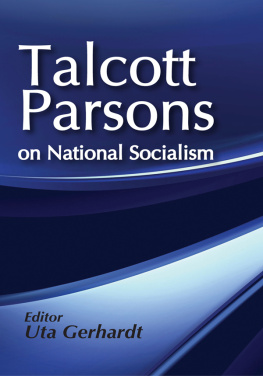Founding Sociology?
Talcott Parsons and the Idea of General Theory
First published 1996 by Longman Group Limited
Published 2014 by Routledge
2 Park Square, Milton Park, Abingdon, Oxon OX14 4RN
711 Third Avenue, New York, NY 10017, USA
Routledge is an imprint of the Taylor & Francis Group, an informa business
Copyright 1996, Taylor & Francis.
All rights reserved. No part of this book may be reprinted or reproduced or utilised in any form or by any electronic, mechanical, or other means, now known or hereafter invented, including photocopying and recording, or in any information storage or retrieval system, without permission in writing from the publishers.
Notices
Knowledge and best practice in this field are constantly changing. As new research and experience broaden our understanding, changes in research methods, professional practices, or medical treatment may become necessary.
Practitioners and researchers must always rely on their own experience and knowledge in evaluating and using any information, methods, compounds, or experiments described herein. In using such information or methods they should be mindful of their own safety and the safety of others, including parties for whom they have a professional responsibility.
To the fullest extent of the law, neither the Publisher nor the authors, contributors, or editors, assume any liability for any injury and/or damage to persons or property as a matter of products liability, negligence or otherwise, or from any use or operation of any methods, products, instructions, or ideas contained in the material herein.
ISBN 13: 978-0-582-29165-2 (pbk)
British Library Cataloguing-in-Publication Data
A catalogue record for this book is
available from the British Library
Library of Congress Cataloging-in-Publication Data
Holmwood, John, 1950
Founding Sociology? : Talcott Parsons and the idea of general
theory / John Holmwood
p. cm.
Includes bibliographical references and index.
ISBN 0-582-29165-8
1. Parsons, Talcott, 1902- . 2. Sociologists--United States.
3. Sociology--United States. I. Title.
HM22.U6P361996
301.092--dc20 95-40206
CIP
Contents
I should like to thank the following friends and colleagues whose encouragement and helpful comments on earlier versions of the book both improved it and kept me to the task: Bob Blackburn, Wendy Bottero, Sarah Caro, Dave Campbell, David Garland, Sarah Irwin, Desmond King, Greg McLellan, Rolland Munro, Martin Kusch, Ken Prandy, John Scott, Adam Seligman, and Janet Siltanen. I owe a special debt of gratitude and friendship to Sandy Stewart with whom I have collaborated for many years and with whom most of the ideas expressed in this book were developed.
Talcott Parsons is one of the most important and most controversial sociologists of the century. Born in 1902, his first publications in sociology were in 1928 and he maintained a prolific output until his death in 1979. His work continues to generate passionate responses, but, as I shall suggest, these are often based upon a fundamental misunderstanding of what he was arguing. In particular, during the 1960s, his work was subjected to extensive criticism, most of it misleading, after which his work was dismissed and frequently used in a ritualistic manner as the summation of all that was deficient in a mainstream, positivist sociology that had been superseded. Recently, however, there has been a revival of interest in his work by some of his erstwhile severest critics. Habermas, for example, argues that, any theoretical work in sociology today that failed to take account of Talcott Parsons could not be taken seriously.
If Parsons has returned to be a central figure in current debates, his work continues to be much misunderstood. It is something of an indictment of the discipline of sociology that the arguments of one of its major figures in the twentieth century remain obscure not just to the practitioners of other disciplines, but also to its own. I hope to remedy this situation in this book. The main reason for writing the book, however, is the intellectual challenge of presenting a new appreciation of Parsonss work and, in the process, contributing to contemporary theoretical arguments.
Part of my purpose will be to set out and evaluate Parsonss ambition to provide a general framework of theory which would serve as a secure foundation for social scientific inquiry. This scheme, he argued, must recognize the importance of human agency and the role of structure. With this framework Parsons sought to synthesize hitherto opposed approaches and, thereby, overcome the tendency of social scientific inquiries to polarize around the mutually opposed claims of structure and action. Taken together, he argued, these different, one-sided approaches seemed to imply a crisis in social scientific reason, with the field characterized by fragmentation and a consequent relativism. In contrast, it was Parsonss belief that the positive contribution of each of the different approaches could be incorporated in a single, coherent theoretical scheme.
Although most social theorists since Parsons have outlined their own undertakings in opposition to that of Parsons, I shall argue that many of his critics share his conception of the foundational role of general theory. My basic contention is that Parsonss general theory is fundamentally flawed and, indeed, that the very programme of general theory in sociology is mistaken. Although general theory is argued by Parsons (and others) to be necessary in order to ground empirical inquiry, it is evident from the fate of Parsonss scheme (and, indeed, the schemes of the current proponents of general theory) that it soon takes on a life of its own and becomes the object of seemingly endless elaborations separated from any programme of social scientific research. A division of theory and research was not what Parsons had intended, nor is it what those who follow the same route intend, but it is, I shall argue, a necessary consequence of the project of general theory. Indeed, for many, the current revival of interest in Parsons will have created considerable misgivings. It will be viewed as confirming the turn of sociological theory away from substantive, located problems of explanation and research, toward issues of meta-theory, or theory about theory. I share these misgivings. Certainly, these are the terms in which Habermas or Giddens address Parsonss work and, it is precisely as a meta-theoretician that Alexander defends and promotes his contribution to current sociological theory. Given the broad acceptance of such a programme or dominant episteme, as Turner calls it the detailed criticism of Parsonss particular version serves a wider, and ultimately more important, purpose; namely, the criticism of the dominant episteme, itself, which has had such a hold over the sociological imagination.
Before I begin my detailed treatment of Parsonss theoretical scheme, I shall first set out the broad contours of theoretical debates in sociology over the last half century. My purpose will be to show a theoretical impasse where attempts at theoretical reconstruction have reproduced the very problems which gave rise to the perceived need for reconstruction. Fragmentation calls forth an attempt at synthesis, but each attempt at synthesis breaks down and is argued to contribute to fragmentation which, once more, is the occasion for others to claim the need for a synthesis. So, Parsons proposed a synthesis of structure and action, but is argued by others to have contributed to their unsatisfactory division in which action is displaced. This is the occasion for others to claim that a synthesis is necessary and the unproductive cycle begins again, but with less certainty that a solution might be achieved.




